【重质高效】Starter Welcome to junior high Lesson 2 Words and Expressions课件--2025年秋新外研版七年级上册
文档属性
| 名称 | 【重质高效】Starter Welcome to junior high Lesson 2 Words and Expressions课件--2025年秋新外研版七年级上册 | 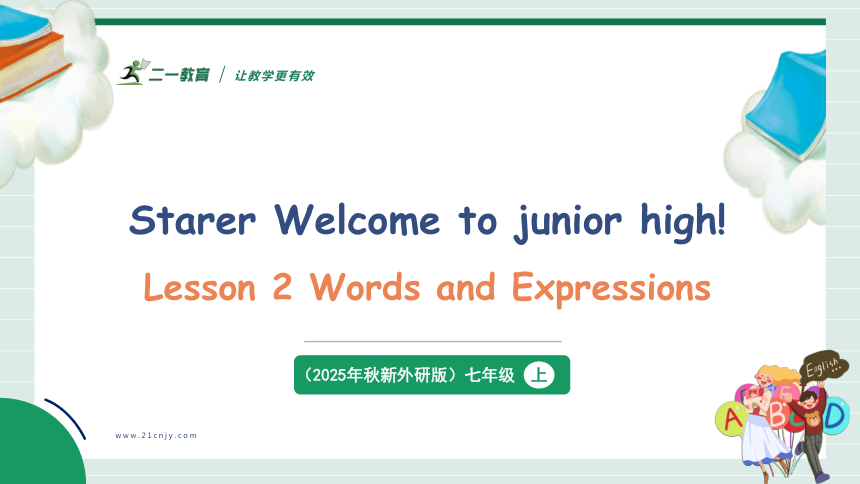 | |
| 格式 | pptx | ||
| 文件大小 | 18.2MB | ||
| 资源类型 | 试卷 | ||
| 版本资源 | 外研版 | ||
| 科目 | 英语 | ||
| 更新时间 | 2025-08-04 13:15:09 | ||
图片预览

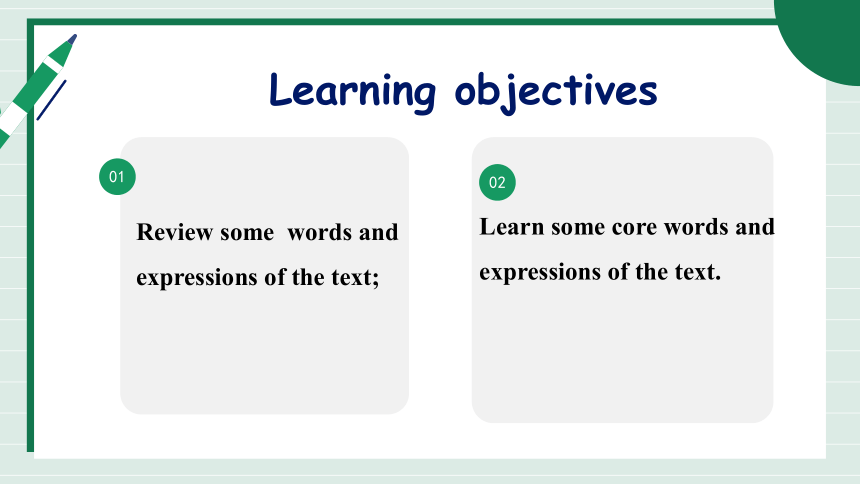
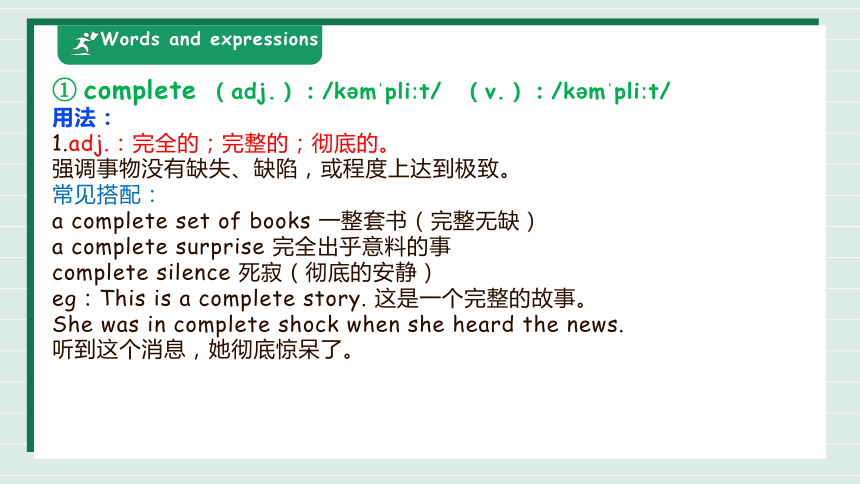
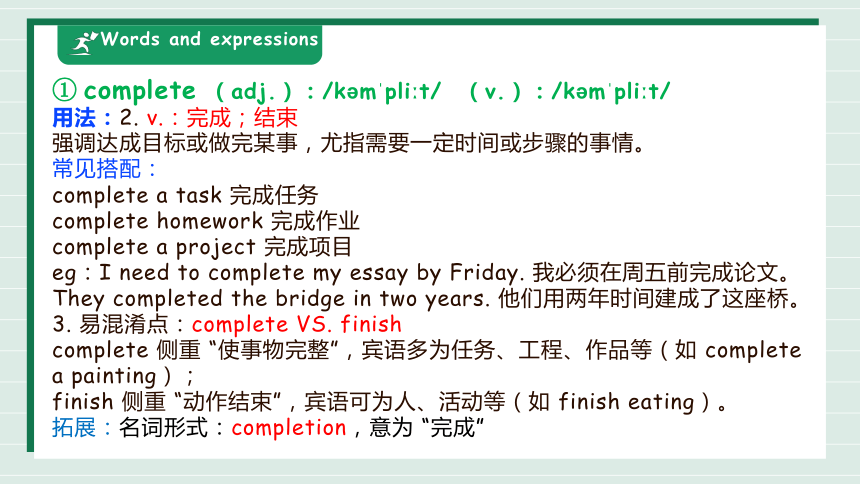
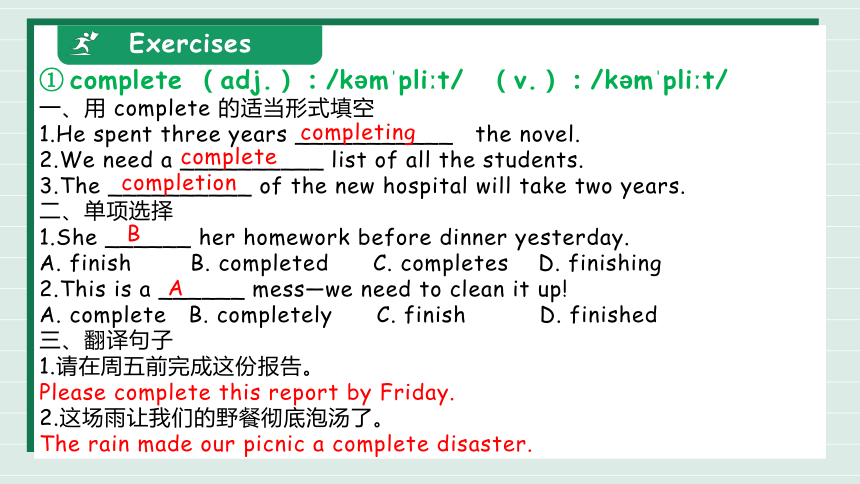
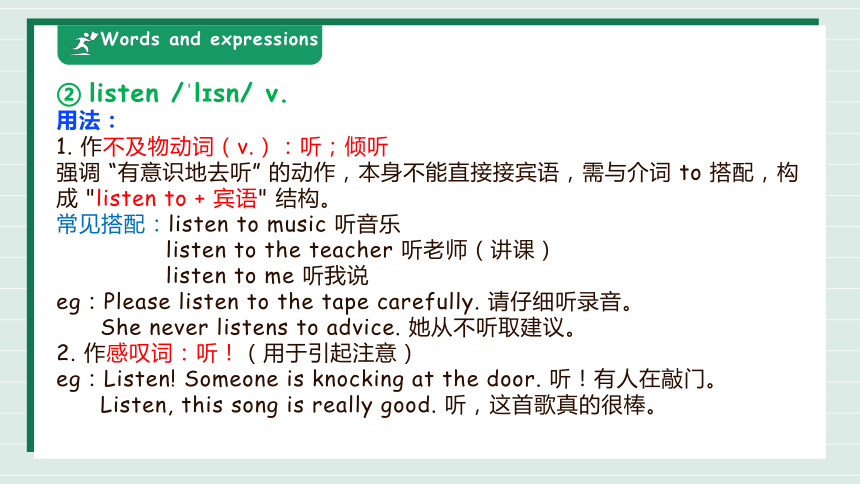
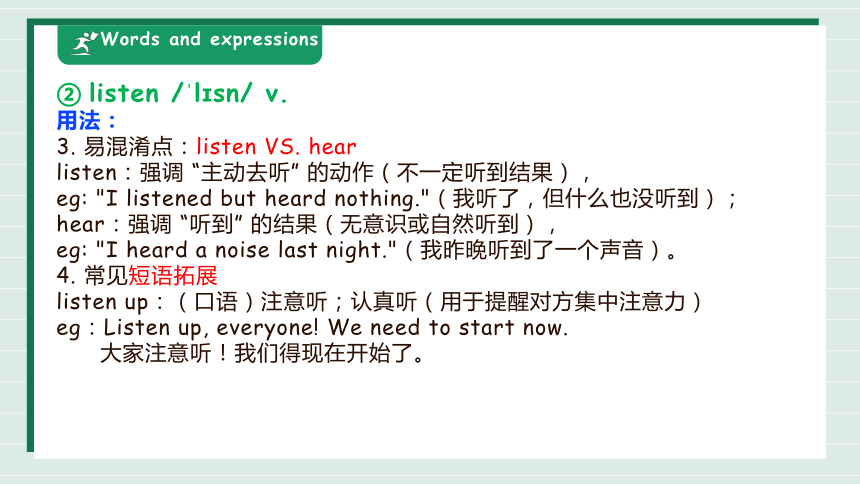
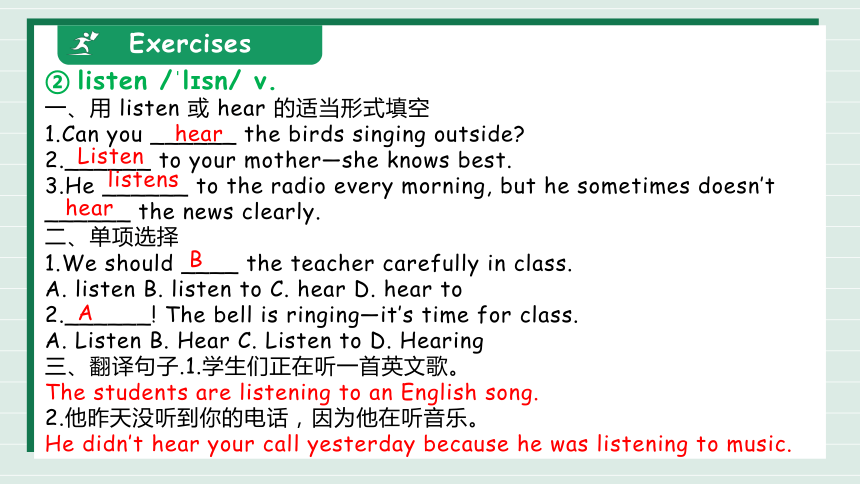
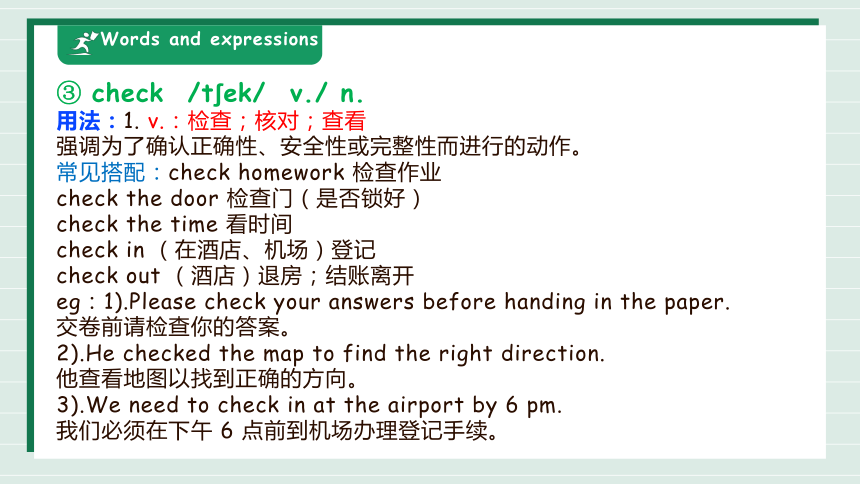
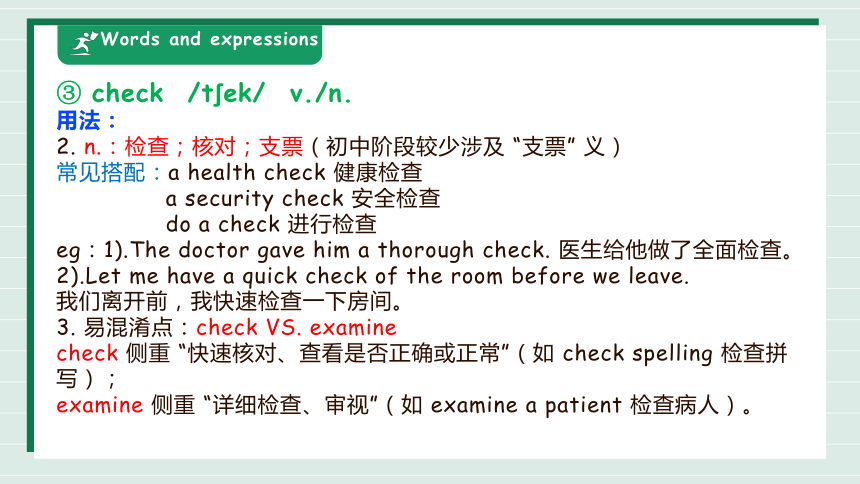
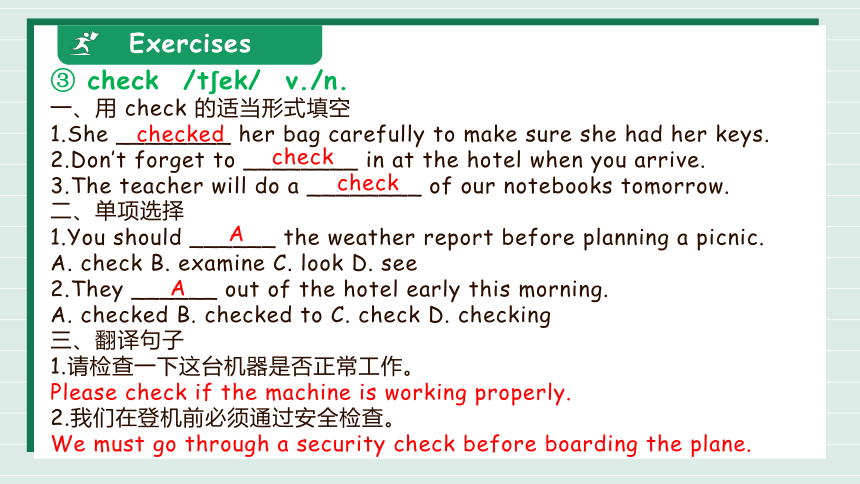
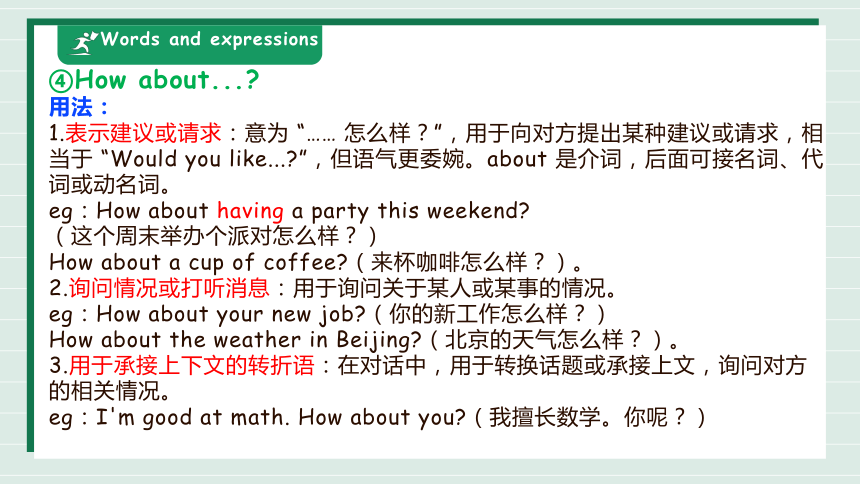
文档简介
(共37张PPT)
Starer Welcome to junior high!
Lesson 2 Words and Expressions
(2025年秋新外研版)七年级
上
Learning objectives
Review some words and expressions of the text;
01
02
Learn some core words and expressions of the text.
Words and expressions
① complete (adj.):/k m pli t/ (v.):/k m pli t/
用法:
1.adj.:完全的;完整的;彻底的。
强调事物没有缺失、缺陷,或程度上达到极致。
常见搭配:
a complete set of books 一整套书(完整无缺)
a complete surprise 完全出乎意料的事
complete silence 死寂(彻底的安静)
eg:This is a complete story. 这是一个完整的故事。
She was in complete shock when she heard the news.
听到这个消息,她彻底惊呆了。
Words and expressions
① complete (adj.):/k m pli t/ (v.):/k m pli t/
用法:2. v.:完成;结束
强调达成目标或做完某事,尤指需要一定时间或步骤的事情。
常见搭配:
complete a task 完成任务
complete homework 完成作业
complete a project 完成项目
eg:I need to complete my essay by Friday. 我必须在周五前完成论文。
They completed the bridge in two years. 他们用两年时间建成了这座桥。
3. 易混淆点:complete VS. finish
complete 侧重 “使事物完整”,宾语多为任务、工程、作品等(如 complete a painting);
finish 侧重 “动作结束”,宾语可为人、活动等(如 finish eating)。
拓展:名词形式:completion,意为 “完成”
Exercises
① complete (adj.):/k m pli t/ (v.):/k m pli t/
一、用 complete 的适当形式填空
1.He spent three years ___________ the novel.
2.We need a __________ list of all the students.
3.The __________ of the new hospital will take two years.
二、单项选择
1.She ______ her homework before dinner yesterday.
A. finish B. completed C. completes D. finishing
2.This is a ______ mess—we need to clean it up!
A. complete B. completely C. finish D. finished
三、翻译句子
1.请在周五前完成这份报告。
Please complete this report by Friday.
2.这场雨让我们的野餐彻底泡汤了。
The rain made our picnic a complete disaster.
completing
complete
completion
B
A
Words and expressions
② listen / l sn/ v.
用法:
1. 作不及物动词(v.):听;倾听
强调 “有意识地去听” 的动作,本身不能直接接宾语,需与介词 to 搭配,构成 "listen to + 宾语" 结构。
常见搭配:listen to music 听音乐
listen to the teacher 听老师(讲课)
listen to me 听我说
eg:Please listen to the tape carefully. 请仔细听录音。
She never listens to advice. 她从不听取建议。
2. 作感叹词:听!(用于引起注意)
eg:Listen! Someone is knocking at the door. 听!有人在敲门。
Listen, this song is really good. 听,这首歌真的很棒。
Words and expressions
② listen / l sn/ v.
用法:
3. 易混淆点:listen VS. hear
listen:强调 “主动去听” 的动作(不一定听到结果),
eg: "I listened but heard nothing."(我听了,但什么也没听到);
hear:强调 “听到” 的结果(无意识或自然听到),
eg: "I heard a noise last night."(我昨晚听到了一个声音)。
4. 常见短语拓展
listen up:(口语)注意听;认真听(用于提醒对方集中注意力)
eg:Listen up, everyone! We need to start now.
大家注意听!我们得现在开始了。
Exercises
② listen / l sn/ v.
一、用 listen 或 hear 的适当形式填空
1.Can you ______ the birds singing outside
2.______ to your mother—she knows best.
3.He ______ to the radio every morning, but he sometimes doesn’t ______ the news clearly.
二、单项选择
1.We should ____ the teacher carefully in class.
A. listen B. listen to C. hear D. hear to
2.______! The bell is ringing—it’s time for class.
A. Listen B. Hear C. Listen to D. Hearing
三、翻译句子.1.学生们正在听一首英文歌。
The students are listening to an English song.
2.他昨天没听到你的电话,因为他在听音乐。
He didn’t hear your call yesterday because he was listening to music.
hear
Listen
listens
hear
B
A
Words and expressions
③ check /t ek/ v./ n.
用法:1. v.:检查;核对;查看
强调为了确认正确性、安全性或完整性而进行的动作。
常见搭配:check homework 检查作业
check the door 检查门(是否锁好)
check the time 看时间
check in (在酒店、机场)登记
check out (酒店)退房;结账离开
eg:1).Please check your answers before handing in the paper.
交卷前请检查你的答案。
2).He checked the map to find the right direction.
他查看地图以找到正确的方向。
3).We need to check in at the airport by 6 pm.
我们必须在下午 6 点前到机场办理登记手续。
Words and expressions
③ check /t ek/ v./n.
用法:
2. n.:检查;核对;支票(初中阶段较少涉及 “支票” 义)
常见搭配:a health check 健康检查
a security check 安全检查
do a check 进行检查
eg:1).The doctor gave him a thorough check. 医生给他做了全面检查。
2).Let me have a quick check of the room before we leave.
我们离开前,我快速检查一下房间。
3. 易混淆点:check VS. examine
check 侧重 “快速核对、查看是否正确或正常”(如 check spelling 检查拼写);
examine 侧重 “详细检查、审视”(如 examine a patient 检查病人)。
Exercises
③ check /t ek/ v./n.
一、用 check 的适当形式填空
1.She ________ her bag carefully to make sure she had her keys.
2.Don’t forget to ________ in at the hotel when you arrive.
3.The teacher will do a ________ of our notebooks tomorrow.
二、单项选择
1.You should ______ the weather report before planning a picnic.
A. check B. examine C. look D. see
2.They ______ out of the hotel early this morning.
A. checked B. checked to C. check D. checking
三、翻译句子
1.请检查一下这台机器是否正常工作。
Please check if the machine is working properly.
2.我们在登机前必须通过安全检查。
We must go through a security check before boarding the plane.
checked
check
check
A
A
Words and expressions
④How about...
用法:
1.表示建议或请求:意为 “…… 怎么样?”,用于向对方提出某种建议或请求,相当于 “Would you like... ”,但语气更委婉。about 是介词,后面可接名词、代词或动名词。
eg:How about having a party this weekend
(这个周末举办个派对怎么样?)
How about a cup of coffee (来杯咖啡怎么样?)。
2.询问情况或打听消息:用于询问关于某人或某事的情况。
eg:How about your new job (你的新工作怎么样?)
How about the weather in Beijing (北京的天气怎么样?)。
3.用于承接上下文的转折语:在对话中,用于转换话题或承接上文,询问对方的相关情况。
eg:I'm good at math. How about you (我擅长数学。你呢?)
Exercises
④How about...
一、单项选择
1.—I'm thinking about going to Paris for a holiday. —______ going there in spring The weather is nice then.
A. Why not B. How about C. Shall we D. Let's
2.—I feel a bit hungry now. —______ having some bread
A. Why not B. What about C. Why don't you D. How
二、用所给词的适当形式填空
1.How about ______ (go) shopping this afternoon
2.I like playing basketball. How about you What sport do you like ______ (play)
三、根据汉语意思完成句子
今天下午去看电影怎么样?
How about __________________ this afternoon
你觉得我的新裙子怎么样?How about __________________
B
B
going
playing
going to the movies
my new dress
Words and expressions
⑤talk /t k/
用法:
1. 作动词(v.):说话;交谈;谈论
强调 “双方或多方之间的对话”,是不及物动词,需搭配介词使用,常见搭配:
talk to sb:对某人说话(侧重单向交流,一方说、另一方听)
eg:The teacher is talking to Tom about his homework. 老师正在跟汤姆谈他的作业。
talk with sb:和某人交谈(侧重双向互动,双方对话)
eg:I often talk with my friends after class. 我经常课后和朋友们聊天。
talk about sth/sb:谈论某事 / 某人(后接谈论的内容)
eg:They are talking about their favorite movies. 他们在谈论自己最喜欢的电影。
其他搭配:talk loudly 大声说话
talk quickly 说得很快
talk on the phone 打电话
Words and expressions
⑤talk /t k/
用法:
2. 作名词(n.):谈话;交谈;演讲
常见搭配:
have a talk 谈话;聊天
a talk show 脱口秀(电视节目)
give a talk 做演讲
eg:
We had a long talk about our future plans.
我们就未来的计划聊了很久。
The scientist will give a talk on space next week.
这位科学家下周将做一场关于太空的演讲。
Words and expressions
⑤talk /t k/
用法:3. 易混淆点:talk vs. speak vs. say vs. tell
单词 用法区别 例句
talk 侧重 “交谈、对话”,不及物动词,需搭配介词(to/with/about) They talk about the game every day.
speak 侧重 “说某种语言” 或 “发言”,可作及物(接语言)或不及物动词 She speaks English very well.
say 侧重 “说的内容”,及物动词,后接宾语(句子、短语等) He says he will come.
tell 侧重 “告诉、讲述”,及物动词,常用搭配 “tell sb sth” 或 “tell sth to sb” My mom tells me a story every night.
Exercises
⑤talk /t k/
一、用 talk 的适当形式填空
1.My parents often ______ with my teacher about my study.
2.Let’s ______ about our trip to the mountains.
She gave a ______ on how to learn English well.
二、单项选择
1.The two girls are ______ to each other happily in the classroom.
A. speaking B. talking C. saying D. telling
2.—What are they ______ about
—They’re talking about the new student.
A. speaking B. telling C. talking D. saying
三、翻译句子
我爷爷喜欢和邻居们聊天。
My grandfather likes talking with neighbors.
talk
talk
talk
B
C
Words and expressions
⑥ have /h v/ v.
用法:
1. 实义动词:表示 “拥有;具有”。含义:强调所属关系或具备某种特征、性质。
eg:She has a new bike.(她有一辆新自行车。)
They have blue eyes.(他们有蓝色的眼睛。)
否定句 / 疑问句:需借助助动词 do/does(一般现在时)或 did(一般过去时)。eg:He doesn’t have a pet.(他没有宠物。)
Did you have a good time (你玩得开心吗?)
2. 实义动词:表示 “吃;喝;进行(活动)”。搭配常见名词,表达具体动作。
eg:We have breakfast at 7:00.(我们 7 点吃早餐。)
They often have a meeting on Monday.(他们经常周一开会。)
Let’s have a walk after dinner.(晚饭后我们去散步吧。)
Words and expressions
⑥ have /h v/
用法:3. 助动词:构成现在完成时(have/has + 过去分词)
表示动作发生在过去,对现在有影响或持续到现在。
eg:I have finished my homework.(我已经做完作业了。)
She has lived here for 10 years.(她在这里住了 10 年了。)
否定句 / 疑问句:直接在 have/has 后加 not 或提前。
eg:He hasn’t seen the film.(他没看过这部电影。)
Have you ever been to Beijing (你去过北京吗?)
4. 固定搭配
have to:必须,不得不(强调客观要求)。
eg:You have to wear a uniform at school.(在学校你必须穿校服。)
have fun/a good time:玩得开心。
eg:They had fun at the party.(他们在派对上玩得很开心。)
Exercises
⑥ have /h v/
一、用 have/has 填空
1.My brother ______ a new car.
2.We ______ English class every day.
3.______ your parents ______ a big house
4.She ______ not finished her work yet.
二、选择正确答案
1.They ______ lunch at 12:00 yesterday. A. have B. had C. has
2.______ you ever ______ to Paris
A. Do; go B. Have; been C. Did; go
3.You ______ to clean your room before dinner. A. have B. has C. had
三、句型转换(改为否定句和一般疑问句)
She has a red skirt.
否定句:________________________
疑问句:________________________
has
have
Do
have
has
B
B
A
She doesn’t have a red skirt.
Does she have a red skirt
Words and expressions
⑦ 1-12 基数词(Cardinal Numbers)
数字 英文拼写 用法示例
1 one I have one book.(我有一本书。)
2 two There are two cats.(有两只猫。)
3 three He has three pens.(他有三支笔。)
4 four We need four chairs.(我们需要四把椅子。)
5 five She is five years old.(她五岁了。)
6 six It costs six dollars.(这要六美元。)
7 seven We go there seven times a month.(我们每月去那里七次。)
8 eight There are eight students.(有八个学生。)
9 nine He wakes up at nine o'clock.(他九点起床。)
10 ten I bought ten apples.(我买了十个苹果。)
11 eleven They have eleven dogs.(他们有十一只狗。)
12 twelve She has twelve friends.(她有十二个朋友。)
Words and expressions
⑦ 1-12 序数词(Ordinal Numbers)
数字 英文拼写 缩写 用法示例
第1 first 1st This is the first day.(这是第一天。)
第2 second 2nd He got the second place.(他得了第二名。)
第3 third 3rd It's on the third floor.(它在三楼。)
第4 fourth 4th Today is the fourth of May.(今天是五月四日。)
第5 fifth 5th She is the fifth in line.(她排在第五位。)
第6 sixth 6th This is my sixth try.(这是我的第六次尝试。)
第7 seventh 7th He was born on the seventh.(他出生在七日。)
第8 eighth 8th It's the eighth lesson.(这是第八课。)
第9 ninth 9th She finished ninth in the race.(她赛跑得了第九名。)
第10 tenth 10th This is the tenth year.(这是第十年。)
第11 eleventh 11th He is the eleventh student.(他是第十一个学生。)
第12 twelfth 12th It's the twelfth month.(这是第十二个月。)
Exercises
⑦ 1-12 基数词/序数词
选择题:
1.There are _____students in our class.
A. forty - five B. fourty - five C. forty five D. fourty five
2.Father's Day is on the _______ Sunday of June.
A. three B. third C. the third D. a third
3.-How old is your sister -She is _______.
A. twelve year old B. twelve years old
C. twelfth years old D. twelve - year - old
4.The _______ month of the year is February.
A. two B. second C. twice D. twoth
5.-Which floor do you live on -I live on the _______ floor.
A. nine B. nineth C. ninth D. nineteen
A
B
B
B
C
Words and expressions
⑧初中阶段常见科目的英文名称
基础学科类
数学:mathematics(简称 math 或 maths)
物理:physics
化学:chemistry
生物:biology
语言类
语文:Chinese(全称 Chinese Language and Literature,常简称为 Chinese)
英语:English(全称 English Language and Literature)
日语:Japanese(部分学校开设的第二外语)
法语:French(部分学校开设的第二外语)
Words and expressions
⑧初中阶段常见科目的英文名称
人文社科类
历史:history
地理:geography
道德与法治:ethics and the rule of law
政治:politics(部分内容会融入 “道德与法治” 课程)
体育与艺术类
体育:physical Education(简称 PE)
音乐:music
美术:art
信息技术:information technology(简称 IT)
其他:科学:science(部分初中阶段会将物理、化学、生物合并为 “科学” 综合课程)
劳动技术:labor technology
Exercises
⑧初中阶段常见科目的英文名称
一、根据中文提示写出相应的科目英文名称。
1.We learn about numbers, shapes and equations in ______ (数学).
2.______ (语文) is the study of our own language, including literature and writing.
3.I like to draw and paint in ______ (美术) class.
二、单项选择
1.We study the human body and how plants grow in ______.
A. biology B. chemistry C. physics
2.______ is very important for us to communicate with people from othr countries.
A. Chinese B. English C. PE
3.In ______ class, we sing songs and learn about different kinds of music.
A. Art B. Music C. IT
maths
Chinese
art
A
B
B
Words and expressions
⑨like /la k/ v./prep.
用法:1. 作动词:表示 “喜欢”,常见搭配及句型
基本用法:like + 名词 / 代词(喜欢某物 / 某人)
eg:I like him very much.(我非常喜欢他。)
like doing sth:表示 “长期喜欢做某事”(习惯性动作)
eg:He likes reading books.(他喜欢看书。)
like to do sth:表示 “偶尔喜欢做某事”(一次性或特定场合的动作)
eg:She likes to watch a movie on weekends.(她喜欢周末看一场电影。)
like sb to do sth:表示 “喜欢某人做某事”
My mother likes me to help with housework.
(我妈妈喜欢我帮忙做家务。)
否定形式:借助助动词 don’t/doesn’t(主语为第三人称单数时用 doesn’t)
eg:I don’t like spicy food.(我不喜欢辛辣食物。)
He doesn’t like swimming.(他不喜欢游泳。)
Words and expressions
⑨like /la k/ v./prep.
用法:2. 作介词:表示 “像;如同”,后接名词 / 代词 / 动名词
常与 be 动词连用(be like),表示 “看起来像……”
She is like her mother.(她长得像她妈妈。)
固定搭配:look like(看起来像)、sound like(听起来像)
He looks like a teacher.(他看起来像个老师。)
Your idea sounds like a good plan.(你的主意听起来像个好计划。)
3. 常见句型拓展:
1).Would you like... :用于委婉请求或邀请(后接名词或 to do sth)
eg:Would you like a cup of tea (你想喝杯茶吗?)
Would you like to go shopping with me (你想和我一起去购物吗?)
2).What do you like :询问对方喜欢什么
eg:—What do you like —I like music.(— 你喜欢什么?— 我喜欢音乐。)
3).How do you like... :询问对某物的看法(= What do you think of... )
eg:How do you like this book (你觉得这本书怎么样?)
Words and expressions
⑨like /la k/ v./prep.
用法:
3.易混淆点辨析
1).like(动词)vs. love(动词):
like 表示 “喜欢”,程度较轻;love 表示 “热爱”,程度更深。
eg:I like English.(我喜欢英语。)
I love my family.(我爱我的家人。)
2).like(介词)vs. as(介词):
like 强调 “像……(但不是)”;as 强调 “作为……(身份或角色)”。
eg:He works like a robot.(他工作起来像个机器人。)
He works as a teacher.(他作为一名老师工作。)
Exercises
⑨like /la k/ v./prep.
一、用 like 的适当形式或搭配填空
1.She likes ______ (dance) in the park.
2.Would you like ______ (eat) some fruit
3.The little girl looks ______ her sister.
4.My father __________ (not like) coffee.
5.They like ________ (play) football on Sundays.
二、单项选择
1.Tom likes _____ TV in the evening.
A. watch B. watching C. watches D. to watching
2.—What does your brother look like
—He _____ his father.
A. likes B. like C. is like D. look like
3.I like _ swimming, but today I don’t like ______ out.
A. go; to go B. going; going C. going; to go D. to go; going
dancing
to eat
like
doesn’t like
playing
B
C
C
Exercises
⑨like /la k/ v./prep.
4.—Would you like some bread
—______.
A. Yes, I like B. No, I don’t C. Yes, please D. No, I wouldn’t
5.How do you ______ this new movie
A. like B. likes C. liking D. to like
三、根据汉语提示完成句子
1.我喜欢在早上读英语。I like ______ English in the morning.
2.她的声音听起来像一只小鸟。Her voice _________ a bird.
3.你喜欢什么颜色?____ do you ______
4.我妈妈喜欢我每天早起。My mother _____me ____up early every day.
C
A
reading
sounds like
What like
likes to get
Words and expressions
⑩in pairs / n pe z/
1. 基本用法:作为方式状语,修饰动词,说明动作的进行方式
常用来描述课堂活动、游戏、任务等的开展形式,常见于祈使句或陈述句中。
Please practice the dialogue in pairs.(请两人一组练习这个对话。)
The teacher asked us to work in pairs on the project.(老师让我们两人一组做这个项目。)
2. 常见搭配场景
课堂活动:discuss in pairs(两人一组讨论)、role-play in pairs(两人一组角色扮演)、solve problems in pairs(两人一组解题)
Let’s discuss the question in pairs first, then share ideas with the class.(我们先两人一组讨论这个问题,然后和全班分享想法。)
日常场景:walk in pairs(成对行走)、sit in pairs(两人并排坐)
The students walked in pairs to the library.(学生们两人一组走向图书馆。)
Words and expressions
⑩in pairs / n pe z/
3.易混淆短语辨析
in pairs vs. in a pair
in pairs:强调 “两人一组的状态或方式”,侧重动作的配合(如合作做某事)。
eg:We often practice speaking in pairs.(我们经常两人一组练习口语。)
in a pair:强调 “作为一对(物品)”,侧重数量或整体(如一双鞋、一对袜子)。
eg:These gloves are sold in a pair.(这副手套按对出售。)
Exercises
⑩in pairs / n pe z/
一、用 in pairs 或 in a pair 填空
1.The teacher told us to work ________ to finish the experiment.
2.These socks are only sold _________.
3.Let’s read the passage ________ and then answer the questions.
二、根据汉语提示完成句子
1.请两人一组练习这个新句型。
Please practice the new sentence pattern __________.
2.我们通常两人一组做英语对话练习。
We usually practice English dialogues _________.
三、单项选择
1.The students are asked to discuss the topic ___.
A. in pair B. in pairs C. on pairs D. with pairs
2.Let’s role-play the conversation ___.
A. in a pair B. on pair C. in pairs D. with pair
in pairs
in a pair
in pairs
in pairs
in pairs
B
C
Homework
1.复习巩固上课所学词汇;
2.订正错题。
https://www.21cnjy.com/help/help_extract.ph
让备课更有效
www.21cnjy.com
Thanks!
Starer Welcome to junior high!
Lesson 2 Words and Expressions
(2025年秋新外研版)七年级
上
Learning objectives
Review some words and expressions of the text;
01
02
Learn some core words and expressions of the text.
Words and expressions
① complete (adj.):/k m pli t/ (v.):/k m pli t/
用法:
1.adj.:完全的;完整的;彻底的。
强调事物没有缺失、缺陷,或程度上达到极致。
常见搭配:
a complete set of books 一整套书(完整无缺)
a complete surprise 完全出乎意料的事
complete silence 死寂(彻底的安静)
eg:This is a complete story. 这是一个完整的故事。
She was in complete shock when she heard the news.
听到这个消息,她彻底惊呆了。
Words and expressions
① complete (adj.):/k m pli t/ (v.):/k m pli t/
用法:2. v.:完成;结束
强调达成目标或做完某事,尤指需要一定时间或步骤的事情。
常见搭配:
complete a task 完成任务
complete homework 完成作业
complete a project 完成项目
eg:I need to complete my essay by Friday. 我必须在周五前完成论文。
They completed the bridge in two years. 他们用两年时间建成了这座桥。
3. 易混淆点:complete VS. finish
complete 侧重 “使事物完整”,宾语多为任务、工程、作品等(如 complete a painting);
finish 侧重 “动作结束”,宾语可为人、活动等(如 finish eating)。
拓展:名词形式:completion,意为 “完成”
Exercises
① complete (adj.):/k m pli t/ (v.):/k m pli t/
一、用 complete 的适当形式填空
1.He spent three years ___________ the novel.
2.We need a __________ list of all the students.
3.The __________ of the new hospital will take two years.
二、单项选择
1.She ______ her homework before dinner yesterday.
A. finish B. completed C. completes D. finishing
2.This is a ______ mess—we need to clean it up!
A. complete B. completely C. finish D. finished
三、翻译句子
1.请在周五前完成这份报告。
Please complete this report by Friday.
2.这场雨让我们的野餐彻底泡汤了。
The rain made our picnic a complete disaster.
completing
complete
completion
B
A
Words and expressions
② listen / l sn/ v.
用法:
1. 作不及物动词(v.):听;倾听
强调 “有意识地去听” 的动作,本身不能直接接宾语,需与介词 to 搭配,构成 "listen to + 宾语" 结构。
常见搭配:listen to music 听音乐
listen to the teacher 听老师(讲课)
listen to me 听我说
eg:Please listen to the tape carefully. 请仔细听录音。
She never listens to advice. 她从不听取建议。
2. 作感叹词:听!(用于引起注意)
eg:Listen! Someone is knocking at the door. 听!有人在敲门。
Listen, this song is really good. 听,这首歌真的很棒。
Words and expressions
② listen / l sn/ v.
用法:
3. 易混淆点:listen VS. hear
listen:强调 “主动去听” 的动作(不一定听到结果),
eg: "I listened but heard nothing."(我听了,但什么也没听到);
hear:强调 “听到” 的结果(无意识或自然听到),
eg: "I heard a noise last night."(我昨晚听到了一个声音)。
4. 常见短语拓展
listen up:(口语)注意听;认真听(用于提醒对方集中注意力)
eg:Listen up, everyone! We need to start now.
大家注意听!我们得现在开始了。
Exercises
② listen / l sn/ v.
一、用 listen 或 hear 的适当形式填空
1.Can you ______ the birds singing outside
2.______ to your mother—she knows best.
3.He ______ to the radio every morning, but he sometimes doesn’t ______ the news clearly.
二、单项选择
1.We should ____ the teacher carefully in class.
A. listen B. listen to C. hear D. hear to
2.______! The bell is ringing—it’s time for class.
A. Listen B. Hear C. Listen to D. Hearing
三、翻译句子.1.学生们正在听一首英文歌。
The students are listening to an English song.
2.他昨天没听到你的电话,因为他在听音乐。
He didn’t hear your call yesterday because he was listening to music.
hear
Listen
listens
hear
B
A
Words and expressions
③ check /t ek/ v./ n.
用法:1. v.:检查;核对;查看
强调为了确认正确性、安全性或完整性而进行的动作。
常见搭配:check homework 检查作业
check the door 检查门(是否锁好)
check the time 看时间
check in (在酒店、机场)登记
check out (酒店)退房;结账离开
eg:1).Please check your answers before handing in the paper.
交卷前请检查你的答案。
2).He checked the map to find the right direction.
他查看地图以找到正确的方向。
3).We need to check in at the airport by 6 pm.
我们必须在下午 6 点前到机场办理登记手续。
Words and expressions
③ check /t ek/ v./n.
用法:
2. n.:检查;核对;支票(初中阶段较少涉及 “支票” 义)
常见搭配:a health check 健康检查
a security check 安全检查
do a check 进行检查
eg:1).The doctor gave him a thorough check. 医生给他做了全面检查。
2).Let me have a quick check of the room before we leave.
我们离开前,我快速检查一下房间。
3. 易混淆点:check VS. examine
check 侧重 “快速核对、查看是否正确或正常”(如 check spelling 检查拼写);
examine 侧重 “详细检查、审视”(如 examine a patient 检查病人)。
Exercises
③ check /t ek/ v./n.
一、用 check 的适当形式填空
1.She ________ her bag carefully to make sure she had her keys.
2.Don’t forget to ________ in at the hotel when you arrive.
3.The teacher will do a ________ of our notebooks tomorrow.
二、单项选择
1.You should ______ the weather report before planning a picnic.
A. check B. examine C. look D. see
2.They ______ out of the hotel early this morning.
A. checked B. checked to C. check D. checking
三、翻译句子
1.请检查一下这台机器是否正常工作。
Please check if the machine is working properly.
2.我们在登机前必须通过安全检查。
We must go through a security check before boarding the plane.
checked
check
check
A
A
Words and expressions
④How about...
用法:
1.表示建议或请求:意为 “…… 怎么样?”,用于向对方提出某种建议或请求,相当于 “Would you like... ”,但语气更委婉。about 是介词,后面可接名词、代词或动名词。
eg:How about having a party this weekend
(这个周末举办个派对怎么样?)
How about a cup of coffee (来杯咖啡怎么样?)。
2.询问情况或打听消息:用于询问关于某人或某事的情况。
eg:How about your new job (你的新工作怎么样?)
How about the weather in Beijing (北京的天气怎么样?)。
3.用于承接上下文的转折语:在对话中,用于转换话题或承接上文,询问对方的相关情况。
eg:I'm good at math. How about you (我擅长数学。你呢?)
Exercises
④How about...
一、单项选择
1.—I'm thinking about going to Paris for a holiday. —______ going there in spring The weather is nice then.
A. Why not B. How about C. Shall we D. Let's
2.—I feel a bit hungry now. —______ having some bread
A. Why not B. What about C. Why don't you D. How
二、用所给词的适当形式填空
1.How about ______ (go) shopping this afternoon
2.I like playing basketball. How about you What sport do you like ______ (play)
三、根据汉语意思完成句子
今天下午去看电影怎么样?
How about __________________ this afternoon
你觉得我的新裙子怎么样?How about __________________
B
B
going
playing
going to the movies
my new dress
Words and expressions
⑤talk /t k/
用法:
1. 作动词(v.):说话;交谈;谈论
强调 “双方或多方之间的对话”,是不及物动词,需搭配介词使用,常见搭配:
talk to sb:对某人说话(侧重单向交流,一方说、另一方听)
eg:The teacher is talking to Tom about his homework. 老师正在跟汤姆谈他的作业。
talk with sb:和某人交谈(侧重双向互动,双方对话)
eg:I often talk with my friends after class. 我经常课后和朋友们聊天。
talk about sth/sb:谈论某事 / 某人(后接谈论的内容)
eg:They are talking about their favorite movies. 他们在谈论自己最喜欢的电影。
其他搭配:talk loudly 大声说话
talk quickly 说得很快
talk on the phone 打电话
Words and expressions
⑤talk /t k/
用法:
2. 作名词(n.):谈话;交谈;演讲
常见搭配:
have a talk 谈话;聊天
a talk show 脱口秀(电视节目)
give a talk 做演讲
eg:
We had a long talk about our future plans.
我们就未来的计划聊了很久。
The scientist will give a talk on space next week.
这位科学家下周将做一场关于太空的演讲。
Words and expressions
⑤talk /t k/
用法:3. 易混淆点:talk vs. speak vs. say vs. tell
单词 用法区别 例句
talk 侧重 “交谈、对话”,不及物动词,需搭配介词(to/with/about) They talk about the game every day.
speak 侧重 “说某种语言” 或 “发言”,可作及物(接语言)或不及物动词 She speaks English very well.
say 侧重 “说的内容”,及物动词,后接宾语(句子、短语等) He says he will come.
tell 侧重 “告诉、讲述”,及物动词,常用搭配 “tell sb sth” 或 “tell sth to sb” My mom tells me a story every night.
Exercises
⑤talk /t k/
一、用 talk 的适当形式填空
1.My parents often ______ with my teacher about my study.
2.Let’s ______ about our trip to the mountains.
She gave a ______ on how to learn English well.
二、单项选择
1.The two girls are ______ to each other happily in the classroom.
A. speaking B. talking C. saying D. telling
2.—What are they ______ about
—They’re talking about the new student.
A. speaking B. telling C. talking D. saying
三、翻译句子
我爷爷喜欢和邻居们聊天。
My grandfather likes talking with neighbors.
talk
talk
talk
B
C
Words and expressions
⑥ have /h v/ v.
用法:
1. 实义动词:表示 “拥有;具有”。含义:强调所属关系或具备某种特征、性质。
eg:She has a new bike.(她有一辆新自行车。)
They have blue eyes.(他们有蓝色的眼睛。)
否定句 / 疑问句:需借助助动词 do/does(一般现在时)或 did(一般过去时)。eg:He doesn’t have a pet.(他没有宠物。)
Did you have a good time (你玩得开心吗?)
2. 实义动词:表示 “吃;喝;进行(活动)”。搭配常见名词,表达具体动作。
eg:We have breakfast at 7:00.(我们 7 点吃早餐。)
They often have a meeting on Monday.(他们经常周一开会。)
Let’s have a walk after dinner.(晚饭后我们去散步吧。)
Words and expressions
⑥ have /h v/
用法:3. 助动词:构成现在完成时(have/has + 过去分词)
表示动作发生在过去,对现在有影响或持续到现在。
eg:I have finished my homework.(我已经做完作业了。)
She has lived here for 10 years.(她在这里住了 10 年了。)
否定句 / 疑问句:直接在 have/has 后加 not 或提前。
eg:He hasn’t seen the film.(他没看过这部电影。)
Have you ever been to Beijing (你去过北京吗?)
4. 固定搭配
have to:必须,不得不(强调客观要求)。
eg:You have to wear a uniform at school.(在学校你必须穿校服。)
have fun/a good time:玩得开心。
eg:They had fun at the party.(他们在派对上玩得很开心。)
Exercises
⑥ have /h v/
一、用 have/has 填空
1.My brother ______ a new car.
2.We ______ English class every day.
3.______ your parents ______ a big house
4.She ______ not finished her work yet.
二、选择正确答案
1.They ______ lunch at 12:00 yesterday. A. have B. had C. has
2.______ you ever ______ to Paris
A. Do; go B. Have; been C. Did; go
3.You ______ to clean your room before dinner. A. have B. has C. had
三、句型转换(改为否定句和一般疑问句)
She has a red skirt.
否定句:________________________
疑问句:________________________
has
have
Do
have
has
B
B
A
She doesn’t have a red skirt.
Does she have a red skirt
Words and expressions
⑦ 1-12 基数词(Cardinal Numbers)
数字 英文拼写 用法示例
1 one I have one book.(我有一本书。)
2 two There are two cats.(有两只猫。)
3 three He has three pens.(他有三支笔。)
4 four We need four chairs.(我们需要四把椅子。)
5 five She is five years old.(她五岁了。)
6 six It costs six dollars.(这要六美元。)
7 seven We go there seven times a month.(我们每月去那里七次。)
8 eight There are eight students.(有八个学生。)
9 nine He wakes up at nine o'clock.(他九点起床。)
10 ten I bought ten apples.(我买了十个苹果。)
11 eleven They have eleven dogs.(他们有十一只狗。)
12 twelve She has twelve friends.(她有十二个朋友。)
Words and expressions
⑦ 1-12 序数词(Ordinal Numbers)
数字 英文拼写 缩写 用法示例
第1 first 1st This is the first day.(这是第一天。)
第2 second 2nd He got the second place.(他得了第二名。)
第3 third 3rd It's on the third floor.(它在三楼。)
第4 fourth 4th Today is the fourth of May.(今天是五月四日。)
第5 fifth 5th She is the fifth in line.(她排在第五位。)
第6 sixth 6th This is my sixth try.(这是我的第六次尝试。)
第7 seventh 7th He was born on the seventh.(他出生在七日。)
第8 eighth 8th It's the eighth lesson.(这是第八课。)
第9 ninth 9th She finished ninth in the race.(她赛跑得了第九名。)
第10 tenth 10th This is the tenth year.(这是第十年。)
第11 eleventh 11th He is the eleventh student.(他是第十一个学生。)
第12 twelfth 12th It's the twelfth month.(这是第十二个月。)
Exercises
⑦ 1-12 基数词/序数词
选择题:
1.There are _____students in our class.
A. forty - five B. fourty - five C. forty five D. fourty five
2.Father's Day is on the _______ Sunday of June.
A. three B. third C. the third D. a third
3.-How old is your sister -She is _______.
A. twelve year old B. twelve years old
C. twelfth years old D. twelve - year - old
4.The _______ month of the year is February.
A. two B. second C. twice D. twoth
5.-Which floor do you live on -I live on the _______ floor.
A. nine B. nineth C. ninth D. nineteen
A
B
B
B
C
Words and expressions
⑧初中阶段常见科目的英文名称
基础学科类
数学:mathematics(简称 math 或 maths)
物理:physics
化学:chemistry
生物:biology
语言类
语文:Chinese(全称 Chinese Language and Literature,常简称为 Chinese)
英语:English(全称 English Language and Literature)
日语:Japanese(部分学校开设的第二外语)
法语:French(部分学校开设的第二外语)
Words and expressions
⑧初中阶段常见科目的英文名称
人文社科类
历史:history
地理:geography
道德与法治:ethics and the rule of law
政治:politics(部分内容会融入 “道德与法治” 课程)
体育与艺术类
体育:physical Education(简称 PE)
音乐:music
美术:art
信息技术:information technology(简称 IT)
其他:科学:science(部分初中阶段会将物理、化学、生物合并为 “科学” 综合课程)
劳动技术:labor technology
Exercises
⑧初中阶段常见科目的英文名称
一、根据中文提示写出相应的科目英文名称。
1.We learn about numbers, shapes and equations in ______ (数学).
2.______ (语文) is the study of our own language, including literature and writing.
3.I like to draw and paint in ______ (美术) class.
二、单项选择
1.We study the human body and how plants grow in ______.
A. biology B. chemistry C. physics
2.______ is very important for us to communicate with people from othr countries.
A. Chinese B. English C. PE
3.In ______ class, we sing songs and learn about different kinds of music.
A. Art B. Music C. IT
maths
Chinese
art
A
B
B
Words and expressions
⑨like /la k/ v./prep.
用法:1. 作动词:表示 “喜欢”,常见搭配及句型
基本用法:like + 名词 / 代词(喜欢某物 / 某人)
eg:I like him very much.(我非常喜欢他。)
like doing sth:表示 “长期喜欢做某事”(习惯性动作)
eg:He likes reading books.(他喜欢看书。)
like to do sth:表示 “偶尔喜欢做某事”(一次性或特定场合的动作)
eg:She likes to watch a movie on weekends.(她喜欢周末看一场电影。)
like sb to do sth:表示 “喜欢某人做某事”
My mother likes me to help with housework.
(我妈妈喜欢我帮忙做家务。)
否定形式:借助助动词 don’t/doesn’t(主语为第三人称单数时用 doesn’t)
eg:I don’t like spicy food.(我不喜欢辛辣食物。)
He doesn’t like swimming.(他不喜欢游泳。)
Words and expressions
⑨like /la k/ v./prep.
用法:2. 作介词:表示 “像;如同”,后接名词 / 代词 / 动名词
常与 be 动词连用(be like),表示 “看起来像……”
She is like her mother.(她长得像她妈妈。)
固定搭配:look like(看起来像)、sound like(听起来像)
He looks like a teacher.(他看起来像个老师。)
Your idea sounds like a good plan.(你的主意听起来像个好计划。)
3. 常见句型拓展:
1).Would you like... :用于委婉请求或邀请(后接名词或 to do sth)
eg:Would you like a cup of tea (你想喝杯茶吗?)
Would you like to go shopping with me (你想和我一起去购物吗?)
2).What do you like :询问对方喜欢什么
eg:—What do you like —I like music.(— 你喜欢什么?— 我喜欢音乐。)
3).How do you like... :询问对某物的看法(= What do you think of... )
eg:How do you like this book (你觉得这本书怎么样?)
Words and expressions
⑨like /la k/ v./prep.
用法:
3.易混淆点辨析
1).like(动词)vs. love(动词):
like 表示 “喜欢”,程度较轻;love 表示 “热爱”,程度更深。
eg:I like English.(我喜欢英语。)
I love my family.(我爱我的家人。)
2).like(介词)vs. as(介词):
like 强调 “像……(但不是)”;as 强调 “作为……(身份或角色)”。
eg:He works like a robot.(他工作起来像个机器人。)
He works as a teacher.(他作为一名老师工作。)
Exercises
⑨like /la k/ v./prep.
一、用 like 的适当形式或搭配填空
1.She likes ______ (dance) in the park.
2.Would you like ______ (eat) some fruit
3.The little girl looks ______ her sister.
4.My father __________ (not like) coffee.
5.They like ________ (play) football on Sundays.
二、单项选择
1.Tom likes _____ TV in the evening.
A. watch B. watching C. watches D. to watching
2.—What does your brother look like
—He _____ his father.
A. likes B. like C. is like D. look like
3.I like _ swimming, but today I don’t like ______ out.
A. go; to go B. going; going C. going; to go D. to go; going
dancing
to eat
like
doesn’t like
playing
B
C
C
Exercises
⑨like /la k/ v./prep.
4.—Would you like some bread
—______.
A. Yes, I like B. No, I don’t C. Yes, please D. No, I wouldn’t
5.How do you ______ this new movie
A. like B. likes C. liking D. to like
三、根据汉语提示完成句子
1.我喜欢在早上读英语。I like ______ English in the morning.
2.她的声音听起来像一只小鸟。Her voice _________ a bird.
3.你喜欢什么颜色?____ do you ______
4.我妈妈喜欢我每天早起。My mother _____me ____up early every day.
C
A
reading
sounds like
What like
likes to get
Words and expressions
⑩in pairs / n pe z/
1. 基本用法:作为方式状语,修饰动词,说明动作的进行方式
常用来描述课堂活动、游戏、任务等的开展形式,常见于祈使句或陈述句中。
Please practice the dialogue in pairs.(请两人一组练习这个对话。)
The teacher asked us to work in pairs on the project.(老师让我们两人一组做这个项目。)
2. 常见搭配场景
课堂活动:discuss in pairs(两人一组讨论)、role-play in pairs(两人一组角色扮演)、solve problems in pairs(两人一组解题)
Let’s discuss the question in pairs first, then share ideas with the class.(我们先两人一组讨论这个问题,然后和全班分享想法。)
日常场景:walk in pairs(成对行走)、sit in pairs(两人并排坐)
The students walked in pairs to the library.(学生们两人一组走向图书馆。)
Words and expressions
⑩in pairs / n pe z/
3.易混淆短语辨析
in pairs vs. in a pair
in pairs:强调 “两人一组的状态或方式”,侧重动作的配合(如合作做某事)。
eg:We often practice speaking in pairs.(我们经常两人一组练习口语。)
in a pair:强调 “作为一对(物品)”,侧重数量或整体(如一双鞋、一对袜子)。
eg:These gloves are sold in a pair.(这副手套按对出售。)
Exercises
⑩in pairs / n pe z/
一、用 in pairs 或 in a pair 填空
1.The teacher told us to work ________ to finish the experiment.
2.These socks are only sold _________.
3.Let’s read the passage ________ and then answer the questions.
二、根据汉语提示完成句子
1.请两人一组练习这个新句型。
Please practice the new sentence pattern __________.
2.我们通常两人一组做英语对话练习。
We usually practice English dialogues _________.
三、单项选择
1.The students are asked to discuss the topic ___.
A. in pair B. in pairs C. on pairs D. with pairs
2.Let’s role-play the conversation ___.
A. in a pair B. on pair C. in pairs D. with pair
in pairs
in a pair
in pairs
in pairs
in pairs
B
C
Homework
1.复习巩固上课所学词汇;
2.订正错题。
https://www.21cnjy.com/help/help_extract.ph
让备课更有效
www.21cnjy.com
Thanks!
同课章节目录
